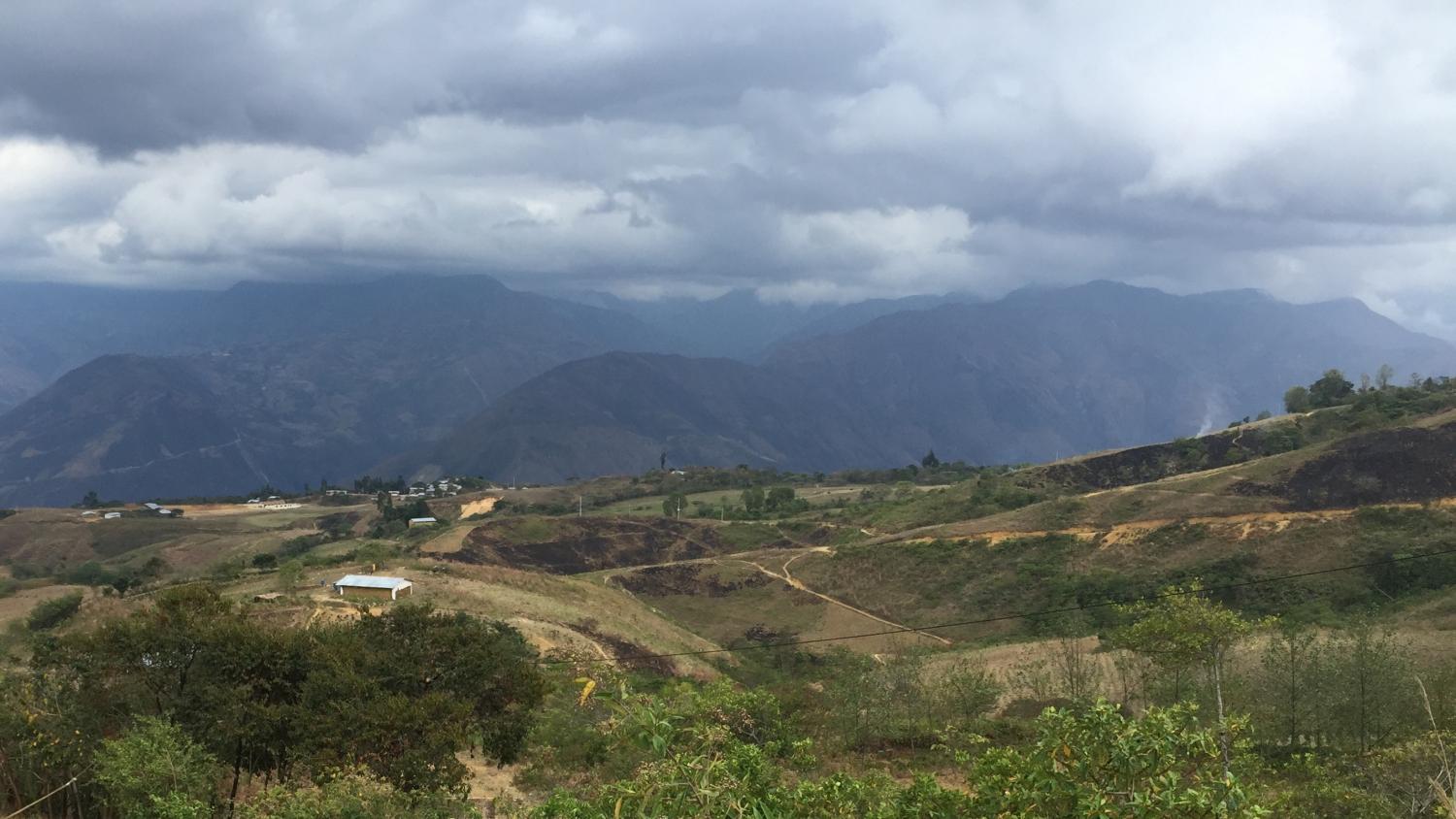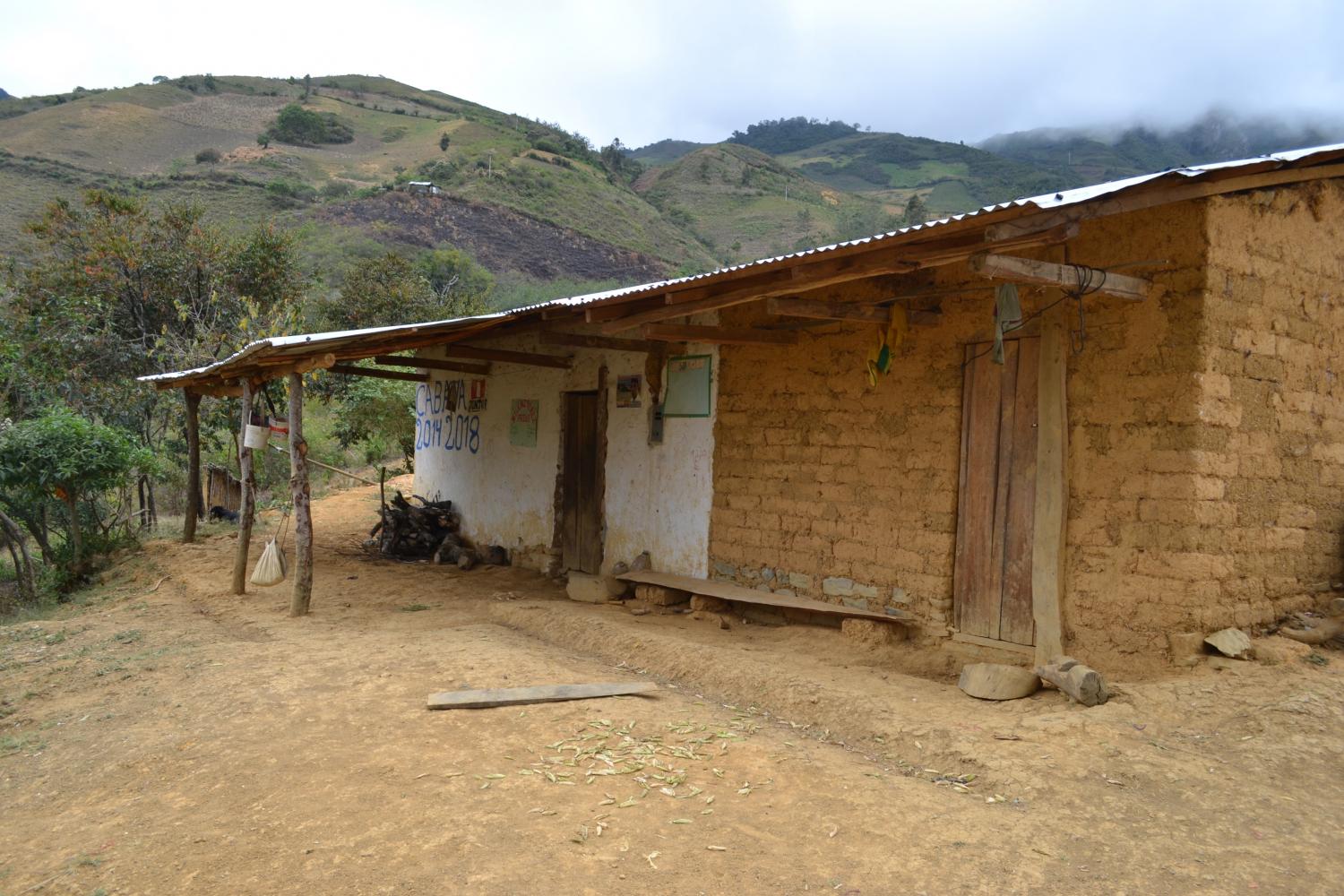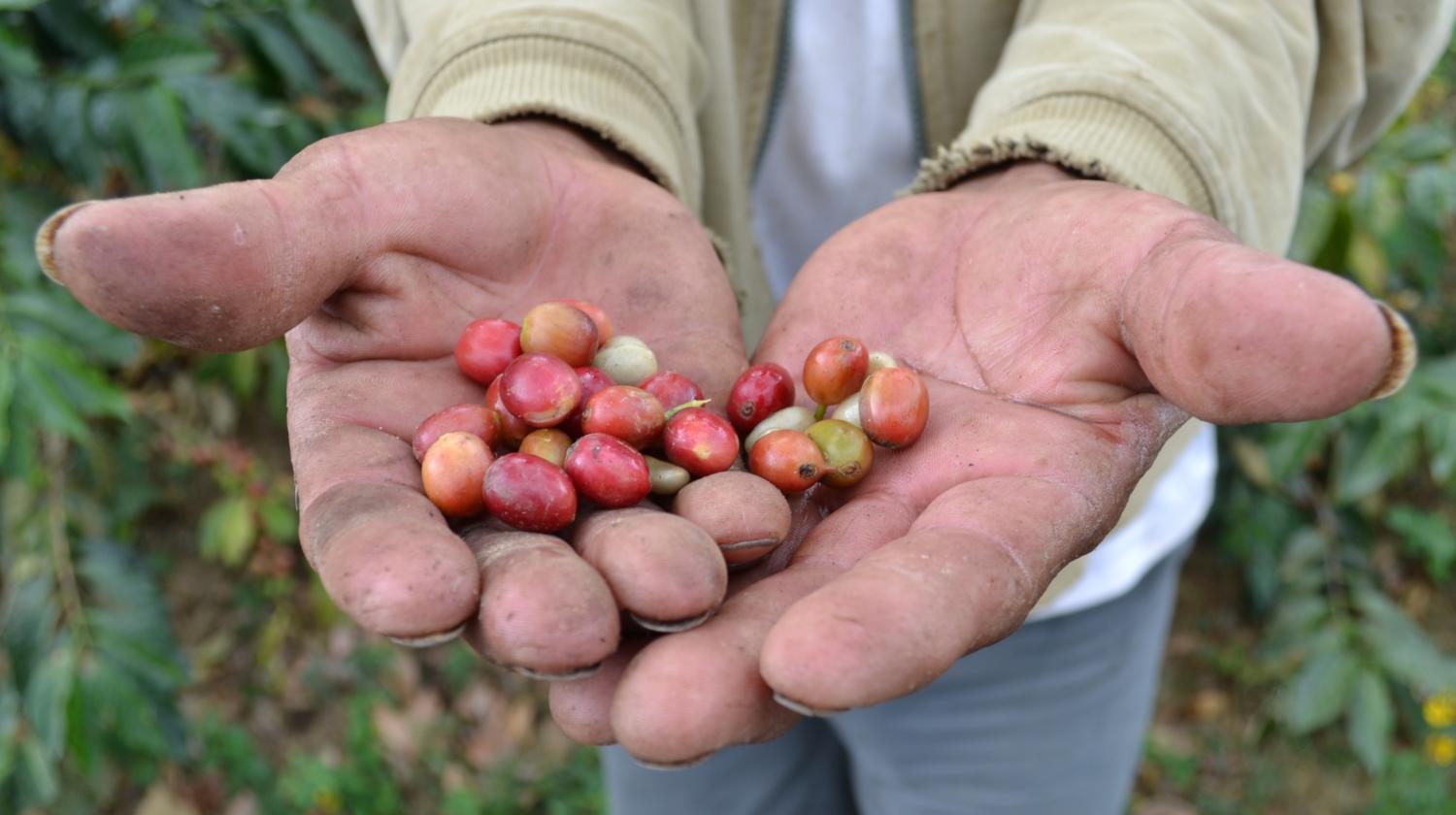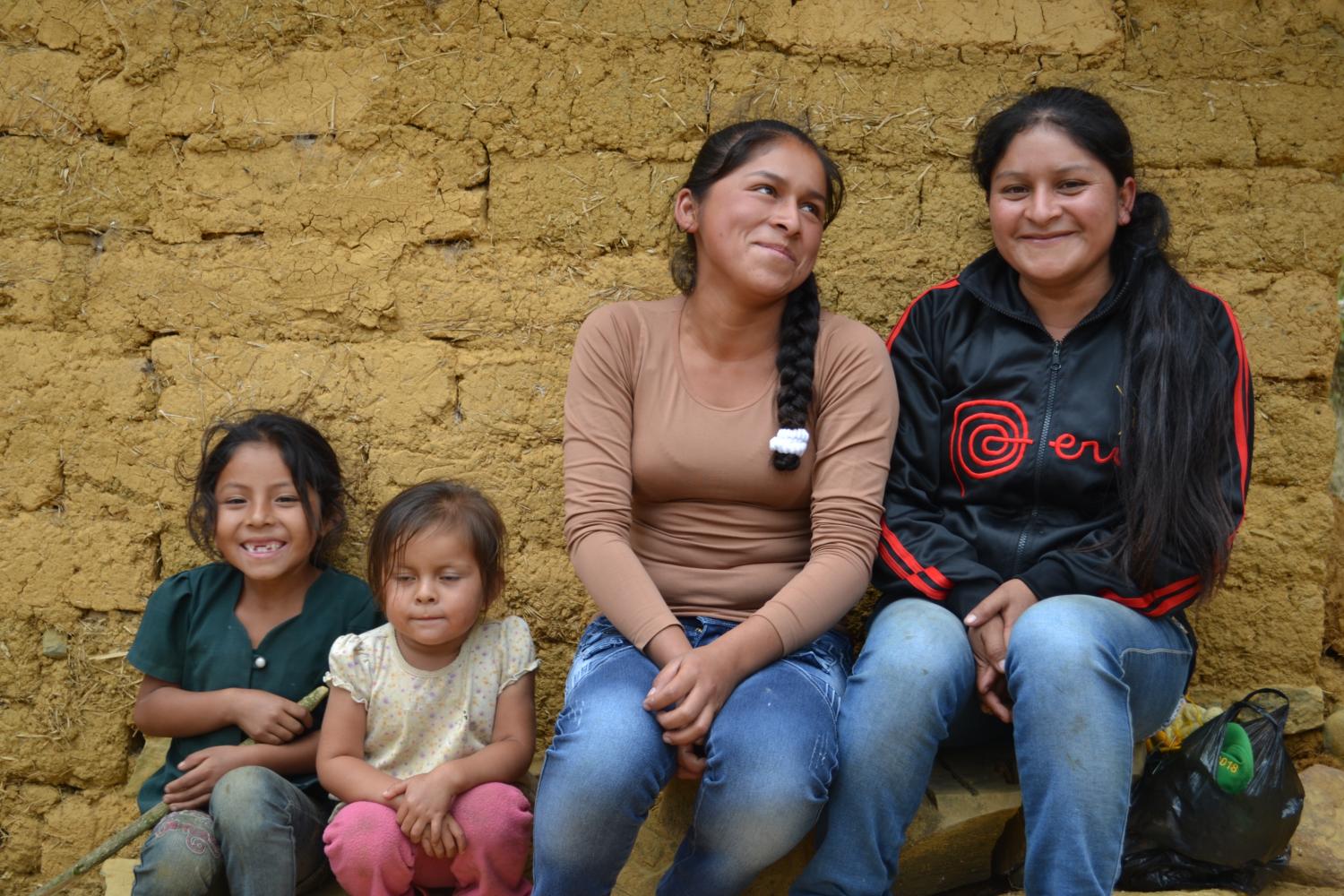Home • Microfinance • Article
The Man Behind the Barista: visiting a coffee grower in Peru
October 1, 2015
Shortly before leaving for my Kiva fellowship, I had an iced coffee so good that I thanked the barista. Today, I got to thank the man who grew the beans--not the actual beans, probably, but the kind of high-quality beans that must have gone into such a drink. Experts say that while Peru doesn't produce nearly the quantity of its famous neighbor, the quality of its coffee can be even bettter, in part because production is on such a small scale, mostly on tiny family farms. Avelino Perez, 62, is one such small coffee farmer; he has taken out a Kiva loan of $325 to buy compost and fertilizer, and it's my job to check that everything's in order, and see how he and his business are doing.
 Where the clouds come down to greet you
Where the clouds come down to greet youPerhaps it's fanciful to suppose that something delicious should come from somewhere beautiful, but Avelino's farm is the stuff wall calendars are made of, tucked away in heaving mountains shrouded in mist and lush with vegetation. From Pucará, a mere hamlet two days north of Lima, it takes three hair-raising hours on a motorcycle to reach him. I've hiked trails that were in better condition than this road. Ebert, the loan officer, and I pass small waterfalls and huge, panoramic vistas. We pull over for trucks, women with babies on their backs, and men in enormous hats with machetes slung over their shoulders. We stop often for directions and still find ourselves puzzling over which scratch in the dirt to follow.
We're greeted by Avelino's son, who says his father is out in the fields, pointing to a black spot I can barely make out a couple ridges down. When we explain that we've come a long way to see Avelino, the son and Avelino's wife and a daughter and grandson send out a bucket brigade of shouts urging him to come in.
 Avelino's house on a hill
Avelino's house on a hillAppearing much more quickly than I would have thought, Avelino is flattered to have a visitor from Pucará, let alone the United States. This is my third borrower visit, but the process continues to remind me of the famous scene in The Wizard of Oz when the film jumps from black and white to color, as this person who was just a face on an Internet page appears live before me. He readily agrees to be photographed, and urges his daughters to pose as well, but they are shy and wary. He is a man of expansive gestures and simple words. His biggest concern seems to be that we might catch cold from the wind (delightfully cool to me after the swelter of Pucará, in the desert plain thousands of feet below); he continuously urges us to rest "inside," by which he means closer to the doorway of his adobe brick house, farther in under the corrugated tin roof, away from the dangling laundry.
I ask if we can see some of his plantings, and he happily leads us down the steep hillside thick with the short, dark-leaved trees that spawn the magic beans.
"Growing coffee must be very hard," I offer.
"No, it's easy," he says.
His weathered hands suggest otherwise.
"What's the hardest part?" I persist.
"Preparing the ground is difficult," he allows. "After that, all is easy."
People in northern Peru have been teased for "singing" their Spanish, and country folk do so even more than city people. The way Avelino says "easy" is the auditory equivalent of a first baseman lobbing a practice throw to home plate: indolently expressive.
 Experienced hands make tasty coffee
Experienced hands make tasty coffeeI ask if he has any dreams, what more he'd like to do with another loan, but he seems baffled by the question. "Improve your house, send your children to school, perhaps?" I suggest. "Yes, yes, these things are very important," he agrees. "Pay medical expenses also." I often have to chide students away from the "poor but happy" stereotype of college essays, so I don't want to romanticize this man who spends his days in backbreaking labor. But there is something refreshingly "grounded" about him, and I realize that the reason he has trouble talking about dreams is that his are essentially the same as everyone's. Some of us chase dreams in business, or firefighting, or sales, or medicine, or teaching--he pursues them with coffee.
Though I fancy myself a connoisseur of coffee, and I've visited both plantations and processing plants before, I learn things from Avelino. Ripe coffee "cherries" are sweet, but unripe ones are tasteless. Not all ripe berries are red; he has one variety that ripens yellow. Most plants mature at the same time, but not all: within a few feet are some whose "cherries" have desiccated into husks, while others are still flowering.
I ask Avelino how much a kilo of coffee sells for: 2 or 3 soles, he says (less than a dollar). I'm almost afraid to tell him that in the US a kilo of good coffee can cost twenty times that or more. "Coffee is the best crop for Peruvians," he insists. Even though he sacrifices most of the profits to distributors and processors, he still nets far more than he would with such common, low-margin crops as corn, beans, or potatoes--which he grows in small quantities for his family, as well as keeping chickens and pigs and a cow or two. He's very proud of his several hectares of coffee, but not too proud to be a subsistence farmer on the side.
 The women in the family consent to a portrait
The women in the family consent to a portraitThe burning question for me is, does he drink his own coffee? Yes, he says, he has his own machine for husking the beans as well as a wooden toaster, but it's the wrong season for that now. Thus my hopes of tasting coffee in the spot where it's grown are dashed--and not for the first time. One of the many ironies of the coffee industry is that the beverage is almost never available anywhere near the plant, because the processing is almost all done in North America and Europe, even though cultivation is exclusive to the tropics.
Avelino is surprised when I tell him that we don't grow coffee in the United States.
"Too cold," I say.
"Aaahhh, it gets cold here too," he says.
"Do you get snow?" I ask.
"Noooo. A sprinkling in the sky, maybe. Nothing on the ground."
"Where I come from in winter the ground is covered in ice and snow."
"So cold!?" he says, almost skeptically. "My plants would not like that."
Night falls fast this close to the equator; dreading the long, breathtaking, butt-pounding ride home, I suggest that maybe, regrettably, it's time to go, thanking Avelino profusely for letting me pester him with questions and photos. Yet the funny thing is, in the end he thanks me.
You can say "thanks" to Avelino and other small-scale farmers by making a Kiva loan of your own at http://www.kiva.org. To support others in Avelino's area, and the microfinance organization where I'm working (Edpyme Alternativa, Chiclayo, Peru), click here.
PREVIOUS ARTICLE
A Few of my Favourite Things →NEXT ARTICLE
A Sourdough Dream: From Costa Rica to San Francisco →













